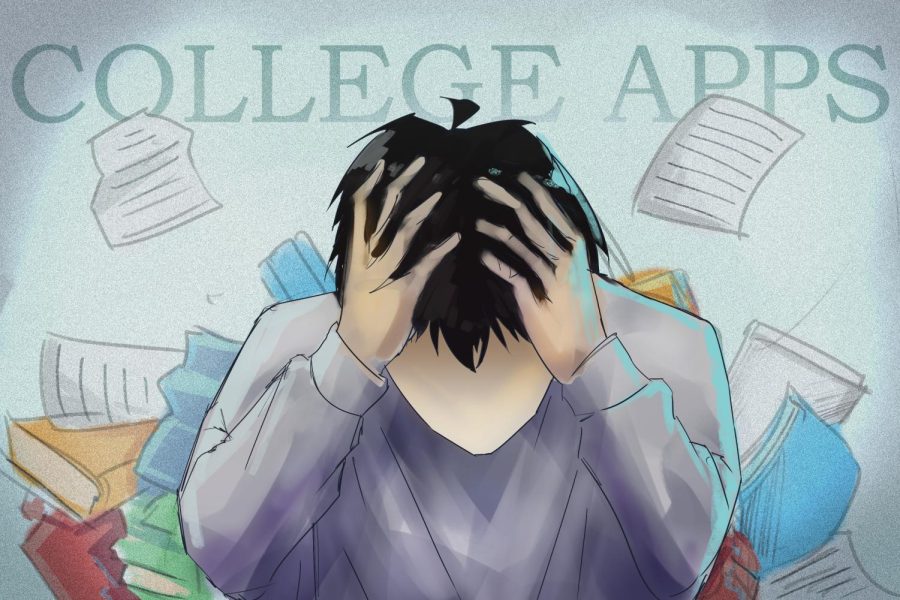College counseling: Students need more help, earlier on
The College and Career Readiness departments across MCPS should focus on extending their resources to students earlier on so they are better prepared for the admissions process.
January 4, 2023
For high school students, the college admissions process is arguably the most stressful part of their experience. But in Whitman’s overachieving environment, this stress begins as soon as freshman year. It first presents itself in the form of rigorous course selection and equally as challenging dives into summer programs — all to improve one’s image on a college application.
U.S. college applications have increased by over 150% in the past two decades even as graduating classes remained the same. College admissions have become increasingly competitive, and our student body’s needs become increasingly demanding. However, the college counseling resources at Whitman and elsewhere in MCPS have remained the same despite these national changes, leaving students without adequate support.
The College and Career Readiness departments across MCPS should focus on extending their resources to students earlier on so they are better prepared for the admissions process.
The concern is one that students continue to raise, according to 2021-22 Montgomery County Student Member of the Board Hana O’Looney.
“No additional counselors were added to the 2023 operating budget,” O’Looney said. “I definitely think that our student-to-counselor ratio is way too high, especially at the high school level. We aren’t meeting nationally recommended ratios.”
Students in MCPS are assigned a school counselor alphabetically based on their last name. Each counselor is responsible for hundreds of students and follows them for their four years of high school.
Through these consistent groups, the schools intend for counselors to get to know their students and become more trusted for mental health support, schedule changes and other stressors students may experience. Yet guidance counselors don’t start supporting students directly with college applications until junior year, and even then, college-specific help remains minimal and the counselors seem stretched thin.
Counselors across the country require students to fill out forms — in MCPS “It’s Time” packets — on their standardized test scores, university interests and academic reflection. Counselors in MCPS, as a result, have to use it in place of actual familiarity when writing students a recommendation.
“I haven’t talked much about college with my assigned counselor, ” senior Emily Gwyn said. “We have to fill out an ‘It’s Time’ packet, which is just to tell our counselors about us so they can write a rec.”
The National Association for College Admission Counseling in their 2021 State-By-State Student-to-Counselor Ratio Map by school district shows MCPS in the 1:300-350 range for the counselor-to-student ratio, roughly a third higher than the NACAC’s 1:250 recommendation. The disproportionate ratio enables those with the financial ability to acquire their college counselors to do so, and the achievement gap between students who have support from private college counselors early on and those who have to navigate the admissions process on their own only worsens.
“We didn’t have money for a college counselor,” Karla Stephan (’22) said. “My mom went through the process with my brother and kind of knew what she was doing.”
For students with older siblings and parents with experience or the financial ability to pay for a college counselor, the college process is more familiar. But for ESOL students, those without older siblings who have applied to college or those lacking in financial resources, the inequity is staggering. For them, the process of making college lists, SAT/ACT preparations and recommendations can be much more daunting than the average student’s already-challenging experience.
“I think another underlying aspect of this conversation needs to be about implicit biases,” O’Looney said. “Why some students receive more attention than others can often be correlated with race, socioeconomic status and the school that a student attends.”
Hiring more college counselors is expensive, but the Board of Education must get its priorities straight. The Board has recently allocated $1.6 million to county-wide telehealth counseling for increased mental health support and cuts teaching and counseling positions in the 2023 operating budget. Students at the high school level are faced with a pressing mental health crisis, but shifting the money to treat the symptom doesn’t address the cause.
For the past nine years at Whitman, now-retired College and Career Readiness department counselor Anne Hutchens aided students with college applications, recommendation letters, school visits and any additional logistics of the admissions process, coordinating for the school. Counseling Secretary Donita Hardie took over Hutchens’ position this fall.
Every high school in MCPS equips itself with one college counselor like Hardie to assist students with the admissions process. BCC college counselor Catherine Heald detailed what her job looks like leading the college and career readiness department.
“My workload is pretty heavy all year round. I’m busy with workshops during the summer, representative visits and applications in the fall, and then financial aid and scholarships while students are waiting for decisions,” Heald said. “It can be overwhelming.”
Students desperately need help with the complex web of college-related issues not later, but now, including summer programs, scholarships, college lists and every other aspect of preparing for the next phase of our lives.
That support doesn’t need to be time-consuming or expensive; it just needs to exist. With the increasing use of technology and access to online mediums used throughout the pandemic, counseling departments should use these types of outlets more. Counselors should be able to effectively host college prep webinars, record tutorials and begin to accrue solutions to these major inequities and imbalances. These solutions also provide accessibility to students without transportation, heavy school workloads and extracurricular responsibilities, bringing support to them.
High school is stressful enough. College preparation doesn’t need to be the heavyweight it’s become, dropped on top of students out of nowhere as soon as they hit senior year. It’s time for our counseling department and others to establish the early, continuous connections that students of today need.










